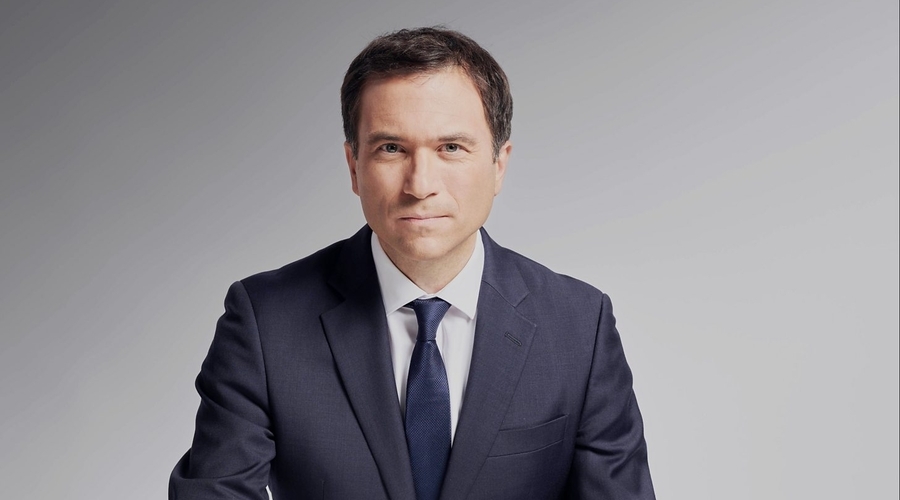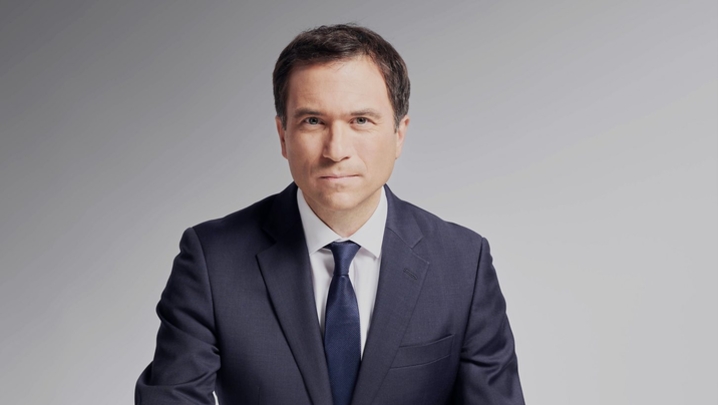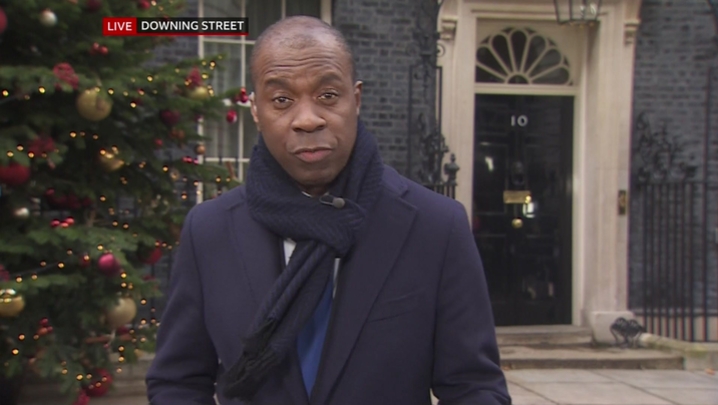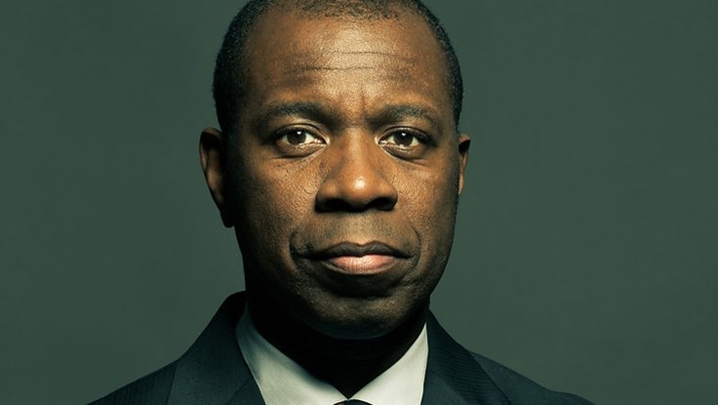‘An extended period of instability and insecurity, especially one resulting from a series of catastrophic events’: if ‘permacrisis’ is the defining word of 2022, as declared by Collins Dictionary, then Ros Atkins, the straight-talking facts man helping us make sense of it all, is surely the year’s defining journalist.
Atkins has been long known to news junkies as the host of Outside Source, the innovative news programme presented live from inside the BBC newsroom which broke new ground in its use of social media and video feeds.
The last twelve months, however, have seen the journalist undergo an explosion in popularity, becoming a household name to casual news consumers on Twitter feeds and beyond. Dubbed the BBC’s ‘explainer-in-chief’, the journalist has become the first port of call for those seeking clarification on the seemingly endless bombardment of breaking news. From dissecting party gate to deciphering Boris Johnson’s perplexing Peppa Pig speech, he has won praise across the political spectrum for his succinct, matter-of-fact explainer videos, which rack up millions of views each.
Now, BBC News’ Analysis Editor is bringing his trademark brand of assertive, fact-driven journalism to his weekly news programme, Ros Atkins on the Week. Rather than focussing on just one story, the programme seeks to set the record straight on the biggest national and international stories of the week, with the same level of analysis, data, fact-checking, and contextualisation that made his short explainers such a success.
“The idea for this programme was for people who are interested in the news, but don't necessarily have time to follow every last twist and turn. Could you create a highly distilled version of some of the most important aspects of the week?” Atkins tells me.
The wide range of topics covered in the opening three episodes include the battle for Kherson in Ukraine, fleeing Foxconn workers in China, and the US mid-terms, with Atkins offering insight on how these seemingly distant stories directly impact us in the UK.
For good reason, politics has dominated the news here in the UK. And if you’ve not seen what’s happening in Iran, this video goes through it. It’s a remarkable story. pic.twitter.com/lrLcoq4h4U
— Ros Atkins (@BBCRosAtkins) October 28, 2022
The programme has received a rapturous response online, from comedian Jack Whitehall praising its ‘smart, accessible journalism’ to secondary school teachers showing episodes to their students in class. How does Atkins keep striking gold?
“I'm not sure there's a set winning formula but, for me, human beings love stories. We love stories when we're children. We love stories sitting around the dinner table. We love stories when we're on holiday talking with people. Stories are an integral part of the human experience, and we like to know what happens next,” Atkins says.
“I saw a guy on Twitter the other day sharing one of our videos say, ‘It feels like this presenter at the beginning is saying, ‘Come here, I've got a story to tell you.’ That's exactly what I'm trying to do,” he adds.
Considering his sustained success, it’s surprising to discover that Atkins nearly gave up journalism altogether in 2019.
Despite Outside Source holding a good spot in the schedule, retaining solid ratings, and winning praise from those both inside and outside the BBC for its innovative format, the programme was struggling to perform in the digital arena. “The work that we were doing on our socials just wasn't cutting through - our numbers were, basically, not very good. And I thought, well, for me, this isn't good enough,” he admits.
So began a three-year journey to solve the elusive problem, how does journalism cut through the noise in the disruptive, lightening-speed world of the internet?
Atkins looked to the work of great storytellers for answers, from stand-up comedians to podcasters and even mates down the pub. He cites podcasts This American Life and The Missing Crypto Queen as sources of inspiration, commenting on the latter: “The team behind [The Missing Crypto Queen] have done a brilliant job of both doing exceptionally important journalism and marrying that up with a story that you're constantly thinking, what happens next, what happens next…”
With the propulsive rhythm nailed, the next step was establishing his unique tone of “assertive impartiality”. Perhaps most striking of all, Atkins’ stories are devoid of the usual key ingredients for internet virality; no stark opinions or inflammatory debates, just irrefutable, verified facts.
“I certainly never try to be judgmental. There's no emotion that's part of it,” he explains. “But certainly, I've experimented with a more sparse, direct, sometimes blunt language around statements from politicians that require correction.”
“[BBC audiences] want us to be more direct because they're looking at information coming at them from politicians, and sometimes they're feeling confused, ‘Is that true? Is that partially true?’”
“Journalism has always been about establishing these things, but I think the language we've used and the way we go about establishing truth and pursuing truth had to evolve,” he says.
In the wake of a notable BBC ‘brain drain’, which saw the likes of Emily Maitlis, Jon Sopel and Andrew Marr depart to ‘find their voice’ elsewhere, Atkins was promoted to the role of Analysis Editor in June ‘to further bolster the BBC’s commitment to impartial journalism’.
THREAD 1/11: Now here's a story. Back in the 90s, along with lots of teenagers in Cornwall, I started going to raves & listening to hardcore and drum & bass. Here's me and my mate Ollie after a long night (Helter Skelter, Milton Keynes, 97...). And yes that is a high viz jacket. pic.twitter.com/Z6NMJA26rc
— Ros Atkins (@BBCRosAtkins) January 17, 2022
As the BBC continues to be embroiled in debates around the licence fee, one pressing cause for concern is how to engage the younger generations. In just a decade, the amount of time 16-24 years olds spend watching traditional TV has collapsed by 2/3rds. “I think it's always been the case that journalism and news needs to find different ways to manifest itself to connect with young people. That was the case when I was a teenager taking an interest in news, it's the case now. Of course, the nature of the challenge has evolved, but the challenge has always been there,” Atkins says.
“I'm working hard all the time thinking about well, who's my journalism for? How do I make it work for these people, the people that I want to reach? That's ongoing. It's always been there for BBC News,” he continues.
“If you look at the arenas where we know young people are spending a lot of time, whether that's consuming programming on demand on iPlayer, or if you're looking at big social media platforms, Facebook, Instagram, Twitter, the BBC has some of the biggest news accounts in the world. And so, I think our ability to flourish, both on our own platforms, and on some of the bigger platforms outside the BBC is well established.”
To ensure survival, Atkins' digital-facing journalism is sure to be key. His carefully crafted news stories appear to hack the elusive algorithm to gain repeated virality, one of the few ways to reach young people online. One only has to look at his viral Twitter thread on his surprise drum & bass mix for Radio 6 Music, which gained him legions of young fans, to see that this man is 'down with the kids'. As for the overwhelming response to his DJ mix, which became the station's most-downloaded show of the year, Atkins says: "[It's] mind bending, frankly. It's beyond anything I imagined that it would do."
Despite being a BBC veteran of over 20 years, having joined as a producer at 5 Live back in 2001, Atkins' passion for the institution shows no sign of waning.
“The funny thing is, and this might sound a little cheesy but it's entirely true, I walk into the BBC, and almost every day I have a little moment where I think, ‘I'm really proud to be doing this,’” he effuses. “I had it when I was a 5 Live, I had it when I walked into Bush House as a BBC World Service producer and presenter, and I have it here now. I’ve been here for 21 years, and the feeling hasn't worn off.”
Ros Atkins On The Week is available to watch now on BBC iPlayer.









